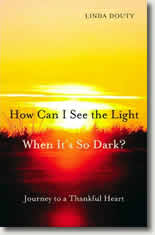Barriers to Gratitude
The following is a brief summary of the audio, which is available by download here.
If you've come to installment 3 in this series, chances are you have begun your journey toward a thankful heart. But despite your best intentions, the path can be rugged and discouraging. In her third talk, Linda Douty addresses the many barriers to gratefulness that confront us, both those that originate in our surrounding culture and those patterns of thinking and behavior that begin inside.
Douty groups these barriers into several categories: She begins with Discounted Thinking, which minimizes our efforts and the thankfulness others express for something we've done. Also toxic to gratefulness is our tendency to cover up or avoid the reality of a situation by insisting that “everything is just great,” a mind-set that goes beyond positive thinking to deny our own authenticity. There’s also the “This can’t last” pattern of thinking, which assumes that the “present fortune is a fluke, the calm before the inevitable storm.”
Comparative Thinking is another barrier that Douty examines, focusing on our tendency to compare ourselves and our possessions with others. There’s the “It could be worse” perspective, in which we “feel more deserving of blessing if we acknowledge that we could be in a more desperate scenario than the one we’re in.”
Or conversely, there's the glass-half-empty attitude, where we tell ourselves, “It could be better than this.”
“Over and over, we prick our full balloon of appreciation, letting the positive air escape because we didn’t get the perfection we projected,” Douty observes.
The third type of thinking that inhibits thankfulness is Guilty Thinking. “It sneaks up wearing many discreet disguises,” and leads us into patterns where we hear ourselves using phrases like…
- I know I should be more grateful.
By using short anecdotes that illustrate each of these guilty-thinking patterns, Douty illustrates how easy it is for us to fall victim to this mentality, suffocating feelings of gratitude and our ability to be thankful in all situations.
Ego-centered Thinking is another barrier Douty points out. “These thought barriers pull grateful energy back into the dark hole of our own self-centeredness,” she says, “implying that we deserve better, or conversely that we are so bad that we deserve worse. The point is that we interpret events within the context of how they affect us.”
- Why did this happen to ME?
Douty turns each of these inside out and demonstrates that thinking patterns that put the ego in the center leave little room for a grateful spirit.
Yet not all of the barriers we confront originate within. External influences can do as much to inhibit gratitude as any of the internal thought patterns that throw us off course.
“The power of outside forces to form our norms for gratitude is as close as the dial on your television set, a ticket to the cinema, or a click on the internet,” Douty says. “It’s as if the speed of today’s technology is constantly outdistancing our ability to reflect responsibly on its effects.”
Depressive Thinking is the last of the barriers Douty examines.
“Sometimes sadness sabotages our gratitude. It’s easy to become engulfed in the worries of the world or our own cares until we sink into patterns of expecting the worst and assuming negative outcomes—depressive thinking.” When we believe that our small and singular contribution can never make a difference, or that our plight is too bleak to allow gratitude to enter, we are dwelling in depressive thinking. Douty points to ways that even then, there is room for thankfulness.
“Our journey to a thankful heart is littered with the boulders and barricades of our own confused thinking,” she concludes, “discounted, comparative, guilty, egocentric, external, and depressive. Rather than hastily brushing the barriers aside, we must be with them with awareness, compassion and forgiveness. That loving process readies us to cross the bridges to a deeper appreciation of life.”
